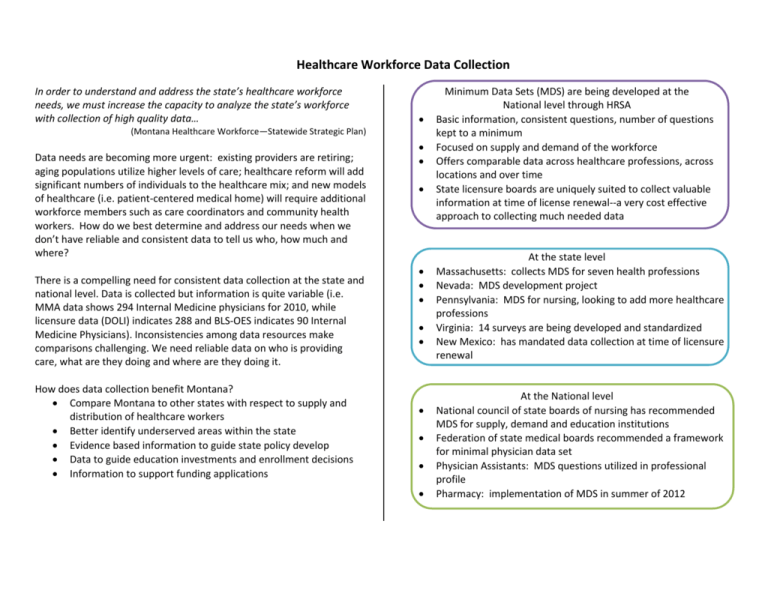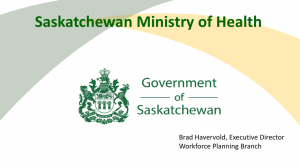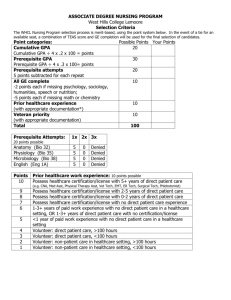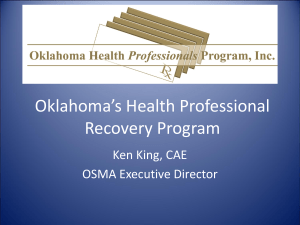Healthcare Workforce Data Collection
advertisement

Healthcare Workforce Data Collection In order to understand and address the state’s healthcare workforce needs, we must increase the capacity to analyze the state’s workforce with collection of high quality data… (Montana Healthcare Workforce—Statewide Strategic Plan) Data needs are becoming more urgent: existing providers are retiring; aging populations utilize higher levels of care; healthcare reform will add significant numbers of individuals to the healthcare mix; and new models of healthcare (i.e. patient-centered medical home) will require additional workforce members such as care coordinators and community health workers. How do we best determine and address our needs when we don’t have reliable and consistent data to tell us who, how much and where? There is a compelling need for consistent data collection at the state and national level. Data is collected but information is quite variable (i.e. MMA data shows 294 Internal Medicine physicians for 2010, while licensure data (DOLI) indicates 288 and BLS-OES indicates 90 Internal Medicine Physicians). Inconsistencies among data resources make comparisons challenging. We need reliable data on who is providing care, what are they doing and where are they doing it. How does data collection benefit Montana? Compare Montana to other states with respect to supply and distribution of healthcare workers Better identify underserved areas within the state Evidence based information to guide state policy develop Data to guide education investments and enrollment decisions Information to support funding applications Minimum Data Sets (MDS) are being developed at the National level through HRSA Basic information, consistent questions, number of questions kept to a minimum Focused on supply and demand of the workforce Offers comparable data across healthcare professions, across locations and over time State licensure boards are uniquely suited to collect valuable information at time of license renewal--a very cost effective approach to collecting much needed data At the state level Massachusetts: collects MDS for seven health professions Nevada: MDS development project Pennsylvania: MDS for nursing, looking to add more healthcare professions Virginia: 14 surveys are being developed and standardized New Mexico: has mandated data collection at time of licensure renewal At the National level National council of state boards of nursing has recommended MDS for supply, demand and education institutions Federation of state medical boards recommended a framework for minimal physician data set Physician Assistants: MDS questions utilized in professional profile Pharmacy: implementation of MDS in summer of 2012 •licensure status (active or inactive) currently provided by state boards; •date of birth - currently provided by state boards; •medical school graduated and year of graduation - currently provided by state boards; •specialty and subspecialty board certification [this can be obtained from certification groups] •employment status [seeks to distinguish between retired and licensed from those with inactive license. What may be more helpful for knowing about access to primary care is knowing if a doctor is employed as a hospitalist and therefore not available to see patients generally]. •does physician provide clinical or patient care. [Does not necessarily separate out hospitalists.] •areas of practice [easiest approach would be check-off.] •practice settings [solo, partnership, single specialty, multiple specialty group, hospital, etc.] •number of weeks worked during past year and average number of hours worked by activity •clinical locations [may be in more than one location, recommended to obtain by hours per site] •hours per week providing patient care by location The National Nursing Workforce Minimum Dataset Federation of State Medical Boards suggestions Current information for Montana Board of Medical Examiners •Business Name and Address •Home Address •Intent to practice in Montana: yes (attach brief explanation) or no. •Questions 12 through 34 related to previous licensure, denials, criminal charges, addiction diagnoses, and use of alcohol "or any other mood-altering substance in a manner which may have or has adversely affected your ability to practice this profession?" •Undergraduate Education •Medical School •Postgraduate Training •Fifth Pathway Program •Exam taken for initial licensure •Ever been certified by a specialty board - which ones? [The question does not ask for current Certification, but it does ask if there was denial of or failure to pass a specialty certification exam or portion of exam.] •Practice history •Professional and character references. •Gender •Race/Ethnicity •Year of birth •Entry level education •Highest level of education •License type •Year of initial US licensure •Country of initial RN/LPN licensure •License status •Advanced practice nurse license/certification •Employment status •Reason for being unemployed •Number of positions employed in •Hours worked per week •Employers address •employment setting hospital, home health, correctional facility, etc.) •employment position (staff nurse, nurse manager, advanced practice nurse, etc.) •employment specialty (acute/critical care, community, med/surg, etc.)




